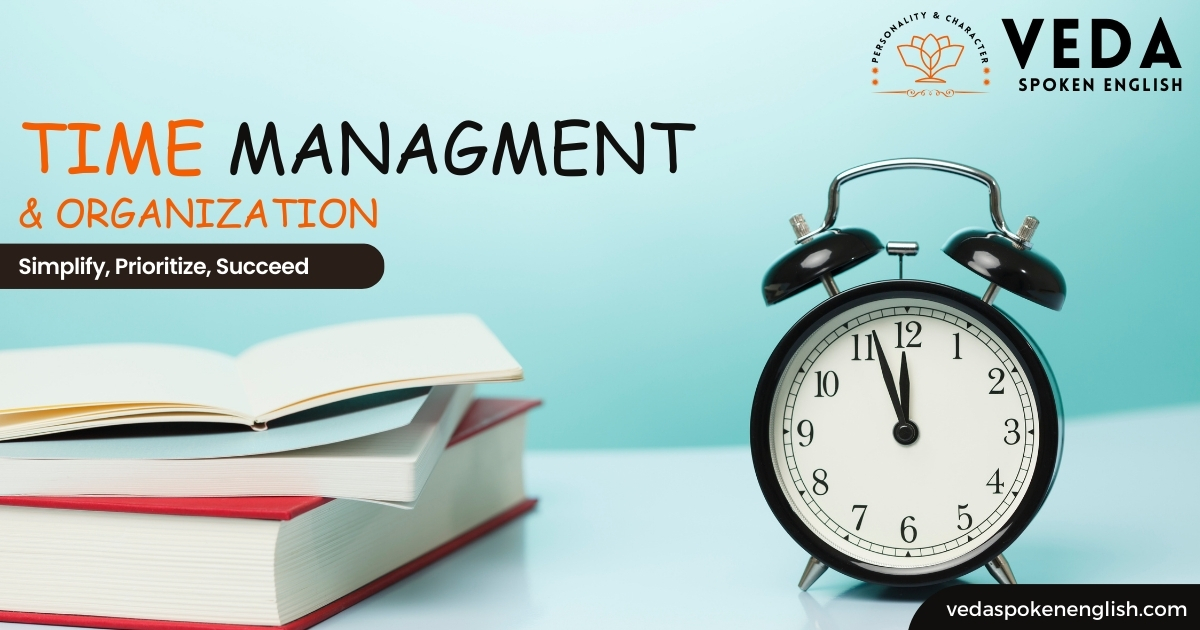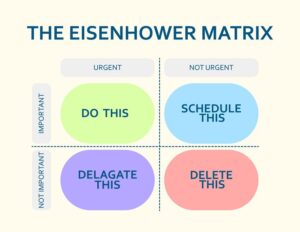
Time Management and Organization: Master Your Day Effectively
In today’s fast-paced world, effective time management and organization are vital for personal and professional success. Whether you’re juggling work deadlines, personal responsibilities, or academic goals, mastering these skills helps reduce stress, increase productivity, and achieve better results.
This guide explores actionable strategies for improving time management and organization, while also highlighting how these skills can transform your daily routine. We’ll also delve into the importance of organization skills and maintaining an organized workflow, offering practical tips to simplify your tasks, prioritize effectively, and ultimately succeed.
The Importance of Time Management and Organization
Mastering time management and organization offers numerous benefits, including improved efficiency, reduced stress, and better decision-making. Let’s take a closer look:
1 . Enhanced Productivity
Effective time management allows you to focus on high-priority tasks, ensuring that your energy is spent where it matters most. With strong organization skills, you can streamline processes, avoid distractions, and create an organized workflow.
2 . Reduced Stress Levels
When tasks are well-organized, and your schedule is under control, you can avoid the anxiety associated with missed deadlines or forgotten commitments. Time management and organization bring structure to your day, helping you feel more in control.
3 . Better Work-Life Balance
By prioritizing tasks and organizing your time, you can dedicate more hours to personal activities, relationships, and self-care. This balance is essential for maintaining long-term success and happiness.
Core Strategies for Time Management and Organization
To excel in time management and organization, it’s crucial to adopt practical strategies that are easy to implement. Below are some proven methods:
1 . Set Clear Goals
Start by identifying your short-term and long-term goals. These should be specific, measurable, achievable, relevant, and time-bound (SMART). Goals provide direction and motivate you to stay focused.
Example: If your goal is to improve your organization skills, break it down into actionable steps like decluttering your workspace or creating a daily task list.
2 . Prioritize Your Tasks
Use prioritization techniques like the Eisenhower Matrix to classify tasks into four categories:
- Urgent and important.
- Important but not urgent.
- Urgent but not important.
- Neither urgent nor important.
This method helps you focus on what truly matters and prevents time-wasting activities from taking over your schedule.

3 . Create an Organized Workflow
An organized workflow is the backbone of efficiency. Here’s how to build one:
- Use Task Management Tools : Apps like Trello, Asana, or Notion help you track and manage tasks systematically.
- Plan Ahead : Dedicate time at the start of each week to outline your tasks and deadlines.
- Batch Similar Tasks: Group similar activities together, such as responding to emails or conducting meetings, to maintain focus and save time.
4 . Manage Your Time Effectively
Time-blocking is an excellent technique for allocating specific periods to tasks. This ensures you stay on track and allocate adequate time to each activity.
- Morning Planning : Start your day by reviewing your schedule and setting intentions.
- Regular Breaks : Incorporate short breaks between tasks to refresh your mind and maintain high productivity levels.
5 . Develop Strong Organization Skills
Improving your organization skills is key to long-term success. These skills help you arrange resources, tasks, and priorities in a way that minimizes effort and maximizes results.
- Declutter Regularly : Keep your workspace clean and free of distractions.
- Label and Categorize : Use folders, labels, or digital tools to organize files and documents for quick access.
Overcoming Challenges in Time Management and Organization
Despite the benefits, mastering time management and organization can be challenging. Here are some common hurdles and how to address them:
1 . Procrastination
Procrastination can derail even the best plans. Combat this by breaking tasks into smaller steps and using tools like the Pomodoro Technique to work in focused intervals.
2 . Overcommitment
Taking on too much can lead to burnout. Learn to say no to non-essential commitments and focus on tasks aligned with your goals.
3 . Perfectionism
Striving for perfection can slow you down. Aim for progress, not perfection, and remember that done is better than perfect.
The Role of Time Management and Organization in Professional Success
In the workplace, time management and organization are essential for meeting deadlines, collaborating with colleagues, and achieving targets. Here’s how they contribute:
1 . Improved Teamwork
Strong organization skills ensure that tasks are clearly assigned and deadlines are met, fostering a productive and collaborative work environment.
2 . Enhanced Leadership
Leaders with excellent time management skills set an example for their teams, inspiring others to stay organized and focused.
3 . Career Advancement
Employers value individuals who can manage their time effectively and maintain an organized workflow, making these skills critical for career growth.
Tools to Enhance Time Management and Organization
Leveraging the right tools can significantly improve your ability to stay on top of tasks. Here are some recommendations:
- Google Calendar : Schedule meetings, set reminders, and block time for focused work.
- Evernote: Capture ideas, create to-do lists, and organize notes seamlessly.
- Toggl Track : Toggl Track how much time you spend on different activities to identify areas for improvement.
Habits for Maintaining an Organized Workflow
Consistency is key to developing and sustaining an organized workflow. Adopt these habits to stay on track:
1 . Daily Planning:
Start each day by reviewing your schedule and to-do list.
2 . End-of-Day Reflection:
Evaluate what you accomplished and plan for the next day.
3 . Regular Audits:
Periodically review your systems and workflows to identify areas for improvement.
Tips for Personal Time Management
Effective time management and organization extend beyond work and can enhance your personal life.
1 . Meal Prep:
Plan your meals in advance to save time and reduce stress during busy weeks.
2 . Family Schedules:
Coordinate schedules with family members to ensure everyone stays informed and organized.
3 . Self-Care:
Block time for relaxation and hobbies to maintain a healthy work-life balance.
Management and Organization
Mastering time management and organization is not a one-time process but a lifelong skill that requires consistent effort and practice. Here are additional habits you can cultivate to ensure long-term success:
1 . Start Each Day with a Purpose
A clear plan at the beginning of the day sets the tone for productivity. Dedicate the first 10 minutes of your morning to review your schedule and prioritize tasks.
- Visualize Your Day: Imagine how you will complete each task, keeping both time management and organization skills in mind.
- Use a Planner : Write down your top three priorities and allocate time slots for them.
2 . Build a Buffer Time for Unexpected Tasks
Not all tasks go as planned, and unexpected responsibilities can disrupt your schedule. Incorporate buffer time between tasks to manage unforeseen challenges.
- Avoid Overloading : Keep 10-15 minutes between meetings or tasks to regain focus.
- Flexibility is Key: Allow room for adjustments while maintaining an organized workflow.
3 . Delegate Tasks Efficiently
Effective delegation is a cornerstone of good time management and organization. Identify tasks that can be handled by others and focus on activities that require your expertise.
- Trust Your Team: Rely on colleagues or family members for support when necessary.
- Communicate Clearly: Provide clear instructions to ensure the task aligns with your expectations.
4 . Monitor Your Progress
Tracking progress is essential for identifying what’s working and what needs improvement.
- Daily Reflection : At the end of each day, evaluate your productivity and note down areas where you can improve your organization skills.
- Weekly Audits : Spend 15-30 minutes each week reviewing your goals and revising your plans.
The Psychological Benefits of Time Management and Organization
Beyond productivity, time management and organization have profound psychological benefits that can enhance your overall well-being:
1 . Reduced Anxiety:
A well-organized schedule removes the uncertainty of forgotten tasks, promoting peace of mind.
2 . Increased Confidence:
Successfully managing your time gives you a sense of accomplishment and boosts your confidence in tackling larger projects.
3 . Improved Focus:
With a clear and organized workflow, distractions are minimized, allowing you to concentrate better on your tasks.
Practical Tools for Enhancing Organization Skills
Here are some tools and methods to refine your organization skills further:
1 . Digital Note-Taking Apps:
Apps like OneNote or Evernote allow you to organize notes, tasks, and ideas efficiently.
2 . File Management Systems:
Use tools like Google Drive or Dropbox to keep digital files categorized and easily accessible.
3 . Kanban Boards:
Visualize workflows using Kanban boards on tools like Trello, which help break projects into manageable tasks.
How to Stay Motivated While Improving Time Management
Staying motivated can be challenging, especially when you’re overwhelmed. Here are tips to keep your energy levels high:
1 . Reward Yourself:
Celebrate small victories, such as completing a challenging task on time.
2 . Incorporate Breaks:
Regular breaks prevent burnout and help maintain an organized workflow.
3 . Reflect on Your Goals:
Remind yourself why improving time management and organization is important for your long-term success.
Conclusion: A Roadmap to Simplify and Succeed
Mastering time management and organization is not just about getting things done—it’s about creating a balanced, fulfilling life. Whether through building strong organization skills, maintaining an organized workflow, or using tools to manage tasks efficiently, every step you take brings you closer to success.
By applying these strategies, you’ll not only simplify your daily routine but also prioritize effectively, leading to meaningful achievements in both your personal and professional life. Stay consistent, embrace flexibility, and continue refining your approach to time management.
Frequently Asked Questions (FAQ’S) :
1 . What is time management and organization?
Time management and organization involve effectively planning, prioritizing tasks, and utilizing resources to achieve goals efficiently and systematically.
2 . What are the 4 types of time management?
The four types of time management are: task prioritization, scheduling, goal setting, and effective delegation for productivity.
3 . What are the 7 steps of time management?
The 7 steps of time management are setting goals, prioritizing tasks, planning, delegating, focusing, avoiding procrastination, and evaluating progress.
4 . What is the main benefit of time management?
The main benefit of time management is increased productivity, reduced stress, and achieving goals efficiently within deadlines.
5 . Why is self-management important for us?
Self-management is vital as it improves productivity, enhances decision-making, reduces stress, and helps achieve personal and professional goals.
